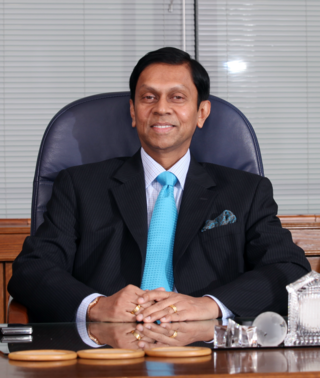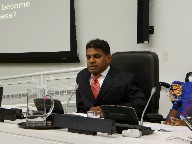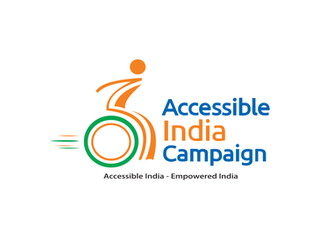 | |
| Formation | 2005 |
|---|---|
| Type | Not-for-profit |
| Location | |
Chief executive / secretary-general | Ajith C. S. Perera |
IDIRIYA [1] is a not-for-profit humanitarian organisation focusing on disability rights based in Sri Lanka. [2]
 | |
| Formation | 2005 |
|---|---|
| Type | Not-for-profit |
| Location | |
Chief executive / secretary-general | Ajith C. S. Perera |
IDIRIYA [1] is a not-for-profit humanitarian organisation focusing on disability rights based in Sri Lanka. [2]
IDIRIYA was founded in 2005 [3] by disability activist Ajith C. S. Perera. [4] [5] [6] [7] [8] [9]
IDIRIYA in 2007 helped formulate the first Sri Lanka building design standard—SLS ISO TR 9527:2006. [10] [11] [12]
A fundamental rights application was filed by IDIRIYA at the Supreme Court of Sri Lanka in March 2009. [13]

The Americans with Disabilities Act of 1990 or ADA is a civil rights law that prohibits discrimination based on disability. It affords similar protections against discrimination to Americans with disabilities as the Civil Rights Act of 1964, which made discrimination based on race, religion, sex, national origin, and other characteristics illegal, and later sexual orientation and gender identity. In addition, unlike the Civil Rights Act, the ADA also requires covered employers to provide reasonable accommodations to employees with disabilities, and imposes accessibility requirements on public accommodations.

The Disability Discrimination Act 1995 is an Act of the Parliament of the United Kingdom which has now been repealed and replaced by the Equality Act 2010, except in Northern Ireland where the Act still applies. Formerly, it made it unlawful to discriminate against people in respect of their disabilities in relation to employment, the provision of goods and services, education and transport.

Accessibility is the design of products, devices, services, vehicles, or environments so as to be usable by people with disabilities. The concept of accessible design and practice of accessible developments ensures both "direct access" and "indirect access" meaning compatibility with a person's assistive technology.
The disability rights movement is a global social movement that seeks to secure equal opportunities and equal rights for all people with disabilities.
Universal design is the design of buildings, products or environments to make them accessible to people, regardless of age, disability, or other factors. It emerged as a rights-based, anti-discrimination measure, which seeks to create design for all abilities. Evaluating material and structures that can be utilized by all. It addresses common barriers to participation by creating things that can be used by the maximum number of people possible. “When disabling mechanisms are to be replaced with mechanisms for inclusion, different kinds of knowledge are relevant for different purposes. As a practical strategy for inclusion, Universal Design involves dilemmas and often difficult priorities.” Curb cuts or sidewalk ramps, which are essential for people in wheelchairs but also used by all, are a common example of universal design.
Web accessibility, or eAccessibility, is the inclusive practice of ensuring there are no barriers that prevent interaction with, or access to, websites on the World Wide Web by people with physical disabilities, situational disabilities, and socio-economic restrictions on bandwidth and speed. When sites are correctly designed, developed and edited, more users have equal access to information and functionality.
Joseph Francis Anthony Soza was a former judge of the Supreme Court of Sri Lanka. He has been described as "an outstandingly independent judge" who "turned out to be a fearless and vocal defender of the rights of victimized people."

National Federation of the Blind v. Target Corporation, 452 F. Supp. 2d 946, was a class action lawsuit in the United States that was filed on February 7, 2006, in the Superior Court of California for the County of Alameda, and subsequently moved to federal court. The case challenged whether the Americans with Disabilities Act of 1990, specifically Title III's provisions prohibiting discrimination by "places of public accommodation", apply to websites and/or the Internet, or are restricted to physical places.

Inclusion, in relation to persons with disabilities, is defined as including individuals with disabilities in everyday activities and ensuring they have access to resources and opportunities in ways that are similar to their non-disabled peers. Disability rights advocates define true inclusion as results-oriented, rather than focused merely on encouragement. To this end, communities, businesses, and other groups and organizations are considered inclusive if people with disabilities do not face barriers to participation and have equal access to opportunities and resources.

Accessible toilets are toilets that have been specially designed to better accommodate people with physical disabilities. Persons with reduced mobility find them useful, as do those with weak legs, as a higher toilet bowl makes it easier for them to stand up. Additional measures that can be taken to add accessibility to a toilet include providing more space, adding grab bars to ease transfer to and from the toilet seat, and providing extra room for a caregiver if necessary. Some countries have requirements concerning the accessibility of public toilets. Toilets in private homes can be modified (retrofitted) to increase accessibility.
The Voting Accessibility for the Elderly and Handicapped Act (VAEHA) P.L. 98-435, 42 U.S.C. §§ 1973ee–1973ee-6, is a United States law passed in 1984 that mandates easy access for handicapped and elderly person to voter registration and polling places during Federal elections. The law also mandates registration and voting aids, such as printing instructions in large font.

Ajith Chrysantha Stephen Perera, JP, CChem., FRSC was a Chartered Chemist by profession, a scholar, a former senior manager in industry, a qualified training instructor, also a former test-match-panel cricket umpire.

Ajith Nivard Cabraal is a Sri Lankan accountant and politician who was also the 16th Governor of the Central Bank of Sri Lanka. He is also the former State Minister of Finance, Capital Markets and State Enterprise Reforms and a former national list member of parliament from 2020 to 2021. He served as the Governor of the Central Bank of Sri Lanka, holding the post from 1 July 2006 until his resignation on 9 January 2015. He again became the Governor of Central Bank of Sri Lanka in September 2021, replacing W. D. Lakshman, and resigned again in April 2022.

Attanayake Mudiyanselage Kithsiri Senarath Bandara Attanayake known as Senarath Attanayake was a Sri Lankan politician and lawyer.
This disability rights timeline lists events relating to the civil rights of people with disabilities in the United States of America, including court decisions, the passage of legislation, activists' actions, significant abuses of people with disabilities, and the founding of various organizations. Although the disability rights movement itself began in the 1960s, advocacy for the rights of people with disabilities started much earlier and continues to the present.

The European Union Persons with Reduced Mobility (PRM) legislation is intended to ensure that Persons with Reduced Mobility traveling via public transport, whether by air, land or sea, should have equal access to travel as compared to travelers with unrestricted mobility. Travel providers are compelled to provide and install sufficient access facilities to enable Passenger with Reduced Mobility to enjoy similar access to other passengers.

Accessible India Campaign or Sugamya Bharat Abhiyan is a program which is set to be launched to serve the differently-able community of the country. The program comes with an index to measure the design of disabled-friendly buildings and human resource policies. The flagship program has been launched by the Prime Minister on 3 December 2015, the International Day of people with Disabilities. The initiative also in line with the Article 9 of the to which India is a signatory since 2007. The scheme also comes under Persons with Disabilities Act, 1995 under section 44, 45, 46 for equal Opportunities and protection of rights which provides non-discrimination in Transport to Persons with Disabilities.
People with disabilities in Sri Lanka typically face significant stigma and discrimination. The main causes for disability in Sri Lanka are poor hygiene, lack of medical care, the prevalence of 30 years of war, the aftereffects of the 2004 tsunami, and an increase in accidents.
As of 2007, there are almost one million people with various levels of physical and mental disabilities in Taiwan. Taiwan adopted a universal healthcare system in 1995 to properly support patient care and provide more transparent access to its people, including those who identify as disabled. Taiwan is a nation that has grown tremendously to support those that are disabled. This includes having a socialized form of medical care that is run by the Executive Yuan. Overall this universal scheme includes the law, public facilities, and educational aspect of healthcare. Taiwan also has different aspects of healthcare to effectively support those that are disadvantaged or disabled, this included subsidies, loans, plans, service guarantee and specific care for medically vulnerable populations. Taiwan's healthcare development and dedication to support its people plays an important role in its transformation of benefits for disabled people.
…. the Government (of Sri Lanka) has declared 2007/08 as the 'Year of Access' and the Sri Lanka Standards Institution (on an initiative made by this writer) responded expeditiously to establish a Sri Lanka Standard for building construction (reference: SL/ISO/TR/9527:2006.)
Chapter 18: Meeting the Building Needs of Disabled People by Dr. A. R. L. Wijesekera."
"I am very happy to confirm that it was the initiative taken by IDIRIYA and its Secretary-General Dr. Ajith C. S. Perera, in proposing to the SLSI on 1 February 2006 and following-up matters thereafter on 15 March 2006 in addressing the SLSI sectoral committee as to the vital need of developing our own building standard in this regard, that paved the way for this achievement of national importance.
Perhaps for the first time, the unassuming but able voice of disabled persons praying for 'justice to access public facilities' echoed loud and clears at the country's apex court. "
" A fundamental rights application aimed at preventing further colossal losses the country incurs, was filed at the Supreme Court by Dr. Ajith C. S. Perera. Submissions were made on behalf of IDIRIYA by this disabled petitioner appearing in person. It was a significant achievement, 'not simply' but the hard way. "
" Laws to require public buildings and facilities to be made accessible to disabled persons were established in 1996 and further strengthened by the introduction of accessibility regulations under this law in 2005 and thereafter, receiving unanimous Parliament approval. "
" However, inept stagnant bureaucracy failed to establish a formal mechanism to implement and pursue the legislation and thereby to deliver practical effect, even in respect of new public buildings. "
" "The Court recognised that in terms of the 'Protection of the Rights of Persons with Disabilities' Act No. 28 of 1996 and accessibility regulations made there under, no person should be discriminated on the ground of disability and their mobility restricted in a manner which precludes or impedes them from gaining reasonable physical access to public buildings and facilities provided within such buildings, especially the toilet facilities. "
".Accordingly, the Court ordered the following. "
".1. All new public buildings as defined in the accessibility regulations No.1 of 2006, should provide 'reasonable access' to persons with physical disabilities. "
" 2. All authorities that are empowered to approve building plans or issue any 'Certificate of Conformity' for public buildings should refrain from doing so in respect of any building which would violate this court order. "
" 3. Failure to comply would draw punitive repercussions as set out in the law (which would very soon be made more stringent) . "
" 4. The proceedings were terminated with liberty to you to file a motion, if there is any violation of the court orders. "
" Clarification of court orders . "
" What's acceptable as 'reasonable access'? It means the following key parts of a new public building stipulated by the accessibility regulations in force, not just the entrances, should be designed in accordance with the minimum design requirements there: floor surfaces, pathways and corridors, doors and entrances, steps and stairs, hand rails and grab bars, ramps (where needed), lifts, toilets, car parks and signage. "
" Design requirements provide the basic essential architectural needs that address the diverse mobility needs of the widest possible range of persons.